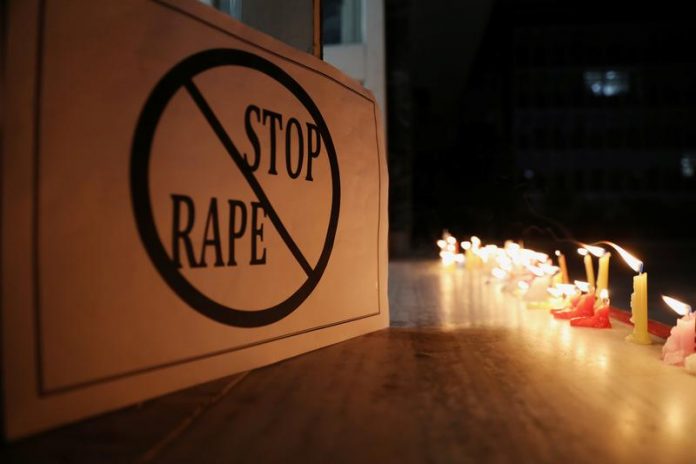This article is written by Smaranika Sen from Kolkata Police Law Institute. This article exhaustively deals with the rape laws in India.
Table of Contents
Introduction
“No means No” had been a viral dialogue when the movie Pink was released. So many articles, columns on social media were written regarding the importance of the term “No means No” especially in the lives of women. But have people realized the value of the term? The answer still lies in the negative. Sexual harassment is one of the heinous offences that are prevalent in society and complaints about the same are raised almost every day. The National Crime Records Bureau released a report regarding sexual offences in the year 2019. The report showed that almost 4 lakh sexual offences had taken place in 2019.
Definition of rape
Before defining the term “rape”, we must understand what sexual offences mean. Sexual offences comprise rape, attempt to commit rape, assault on women with intent to outrage her modesty and insult to the modesty of a woman.
The definition of rape is stated in the Indian Penal Code, 1860. Section 375 of the Indian Penal Code defines rape as:
- Whenever a man penetrates his penis into the vagina, mouth, urethra, or anus of a woman or even makes her do the same with him or any other person; or
- Whenever a man inserts any object or a part of the body into the vagina, urethra, or anus of a woman or makes her do the same with him or any other person; or
- Whenever a man manipulated any part of the woman to cause penetration or makes her do the same with him or any other person; or
- Whenever a man applies his mouth to the vagina, anus, urethra of a woman or makes her do the same with him or any other person.
Provided that the above has been done:
- Against the woman’s will;
- Without the woman’s consent;
- With the woman’s consent, such consent has been obtained by putting her or any other person whom she is interested in fear of death or hurt;
- With the woman’s consent but the man has the knowledge that he is not the husband of the woman. However, the woman believes that he is her husband whom she is lawfully married to, and has given consent in this regard;
- With the woman’s consent but such consent has been obtained in the intoxication of mind, unsoundness of mind;
- With or without the consent of the woman, when she is below eighteen years of age.
- In such cases where the woman is unable to communicate consent;
- It has to be also kept in mind that a woman not showing any physical resistance to the act of penetration does not indicate it to be consent. This clause is important as previously, the absence of this law manifested certain judgments which proved to be a failure to safeguard a woman’s rights. In the case of Mohammed Habib v. State (1988), the Delhi High Court held that there were no such marks on the genital parts of the victim which showed resistance. Even the hymen was completely ruptured and there were bite marks and an eye-witness to the entire incident did not amount to rape. The accused was acquitted.
If a man commits any of the above acts he is said to have committed rape.
However, a medical examination procedure or intervention and sexual intercourse committed by a man with his wife who is or above fifteen years of age will not constitute rape.
In the case, Deepak Gulati v. the State of Haryana (2013), an issue was raised that whether intercourse under a promise to marry constitutes rape or not. The court held that intercourse under the promise to marry can only amount to rape if the accused from the initial stages had no intention to marry the woman. The court further added that the accused can be only convicted of rape if it was observed that the intention was mala fide and the accused had clandestine motives.
Amendment in 1983
The amendment in 1983 took place due to an infamous rape case also known as the Mathura rape case. The case was regarding a custodial rape case of a young tribal girl in Desaiganj police station. The Sessions Court held that the policeman was not guilty as there were no such alarms raised by the girl. The Nagpur Bench of Bombay High Court set aside the judgment and sentenced the police officer to imprisonment. However, the Supreme Court acquitted the accused on the grounds of lack of evidence. This created huge protests and various amendments were made to the existing law system. The major changes were that custodial rape was identified as a sexual offence, the onus of the burden of proof rests on the accused as soon as the act of sexual intercourse was established, the victim’s identity was not disclosed, rape trials started to conduct in-camera proceedings. Also, several amendments were made in the Indian Penal Code, Code of Criminal Procedure, 1973, and the Indian Evidence Act, 1872.
Amendment in 2013
Before 2013, the definition of rape in the Indian Penal Code was not quite widely described as it is now. 16th of December, 2012 is considered a black day in the history of India. On this day 16th of December, 2012, a gang rape took place which severely shook the entire nation. This led to huge nationwide protests and it was also observed that the rape laws in India are not quite sufficient. The definition of rape, before 2013, was limited to the act of penetration. This clearly showed that the definition is hugely lacking to constitute several heinous offences as rape, thereby leading the victims not to get justice. The case was also covered by the international media because radical reforms were required to save the women of the country. The United Nations Entity for Gender Equality and Empowerment of Women informed the Government of India to make reforms in the required sections to make the life of women safer and secure.
On the 23rd of December 2012, the Justice Verma Committee was formed whose main aim was to review all the existing laws that were there for sexual offences and to suggest the amendments. The Committee also aimed to suggest measures for speedy trials in such grave and heinous offences and harsh punishments for such criminals who commit such heinous crimes. The Committee was headed by honourable Justice J.S. Verma, former Chief Justice of the Supreme Court. The Committee also welcomed the point of view of various eminent jurists, legal professionals, the public, etc.
The Committee submitted its report with the suggestion of bringing several changes in the following areas:
- Punishment of rape;
- Punishment for other sexual offence;
- Registering complaints and examination; and
- Bill of Rights for Women.
This inclusive report of 630 pages was a landmark suggestion. It was appreciated globally. This eventually led to the passing of the Criminal Law (Amendment) Act, 2013. The amendment defined the term rape widely so that no one lies outside the realm of justice. The Act also recognized the rarest of rare cases and the police will also face penal charges if they refuse to take any FIR. Further, it criminalized offences like sexual voyeurism and stalking. Moreover, various amendments were made in the Indian Penal Code, Code of Criminal Procedure, and the Evidence Act to give effect to the same.
Amendment in 2018
In the years 2017 and 2018, the nation again witnessed two unfortunate rape cases that led to amendments in the existing laws:
- Unnao Rape Case: A 17-year-old girl was the victim of a gang rape that took place in Unnao, Uttar Pradesh. The main accused here was a politician who was sentenced to life imprisonment.
- Kathua Rape Case: A very young girl of 8 years was the victim of this immoral act and was murdered. It was also observed that she was kidnapped and kept in a place.
These two cases deeply shook the minds of the people. Nationwide protests began for their justice. This led to amendments in the Indian Penal Code, POCSO Act, 2012, Code of Criminal Procedure, and the Evidence Act.
Various statutes for rape
Indian Penal Code, 1860
Punishment for rape is mentioned in Section 376 of the Indian Penal Code. It states that anyone who has committed rape will be punished with rigorous punishment for a term of not less than ten years which might extend to life imprisonment and be liable to a fine. If a-
- Police officer,
- Public servant,
- Member of the armed forces of State or Central Government,
- Member of the management staff of a jail or remand home or other places of custody,
- Member of the management staff of a hospital,
- A relative of the victim or guardian or teacher or a person who is in a position of trust towards the victim.
Commits rape then the above shall be punished with rigorous imprisonment for a term of not less than ten years which might extend to life imprisonment and be liable to fine.
If someone commits rape-
- During communal violence;
- Knowing the woman to be pregnant;
- Who is Incapable of giving consent;
- On a woman suffering from both mental and physical disability;
- Causes bodily harm endangers the life of a woman or disfigured;
- Repeatedly then the person shall be punished with rigorous imprisonment for a term of not less than ten years which might extend to life imprisonment and be liable to fine.
Anyone who commits rape on a woman who is below sixteen years of age shall face a punishment of rigorous imprisonment for a term of not less than twenty years which may extend to life imprisonment, and be liable to pay a fine.
The provision of Section 376 has allowed the courts to award a lesser sentence than the minimum prescribed for rape where there are any “special and adequate reasons”. In the case of Gopi v Karnataka (2013), it was observed that the appellant was sentenced to 10 years of imprisonment. An appeal was made on compassionate grounds. The Apex Court allowed the appeal by taking into consideration that the appellant’s two daughters were of the age of marrying.
Zero tolerance policy in case of child-rape
Increasing cases of child rape led the Supreme Court to suo moto register a PIL and take it up for hearing and address the issues. The court considered that special investigations are required to look into the matter of child rapes. The court also stated the need for special courts for speedy trials.
- Section 376A states the punishment for causing the death of a woman or causing such harm while committing rape which leads to a persistent vegetative state of the victim. The person committing such crime shall face a punishment of rigorous imprisonment for a term of not less than twenty years which may extend to life imprisonment.
- Section 376AB states the punishment for those persons who commit rape on a woman who is below 12 years of age. The person committing such crime shall face a punishment of rigorous imprisonment for a term of not less than twenty years which may extend to life imprisonment, be liable to pay a fine, or can also be given the death penalty.
- Section 376B states that any person who commits sexual intercourse with his wife while a decree of separation is given and living separately without the consent of the woman shall face imprisonment for a term of not less than 10 years which may extend up to 7 years or be liable to fine.
- Section 376C states that if-
- Public servant,
- Member of the management staff of a jail or remand home or other places of custody,
- Member of the management staff of a hospital,
- Someone who is in a fiduciary relationship.
Uses his position to induce or seduce any woman for sexual intercourse and such intercourse does not amount to rape then that person will be punished with rigorous imprisonment for a term of not less than 5 years and be liable to fine:
- Section 376D states the punishment for gang rape. Whenever a woman is raped by one or more persons constituting a group having a common intention then each of those persons will be deemed to have committed rape and will face a punishment of rigorous imprisonment of not less than 20 years which may extend to life imprisonment and be liable to pay a fine.
- Section 376DA states whenever a woman who is below 16 years of age is raped by one or more persons constituting a group having a common intention then each of those persons will be deemed to have committed rape and will face life imprisonment and be liable to pay a fine.
- Section 376DB states whenever a woman who is below 12 years of age is raped by one or more persons constituting a group having a common intention then each of those persons will be deemed to have committed rape and will face life imprisonment and be liable to pay a fine or with death.
- Section 376E states that whoever has been previously convicted of any offences falling under the purview of any other previous sections and further convicted of any offence falling under the previous sections then he/she will face imprisonment for life or with death.
- Section 228A states no persons are allowed to disclose the name of the rape victim and if someone discloses it, then he/she shall face imprisonment for 2 years and be liable to a fine.
Indian Evidence Act, 1872
Section 114A states that certain presumptions can be made as to the absence of consent in certain prosecution of rape.
Code of Criminal Procedure
- Section 53A states about the procedure of examination of a person accused of rape by a medical practitioner.
- Section 164A states the procedures for medical examination of the rape victim.
- Section 327 states that in rape cases, trials will take place in-camera proceedings.
Protection of Children from Sexual Offences (POCSO) Act, 2012
This Act mainly recognizes sexual offences against children. Another significance of this Act is that it acknowledges sexual offences committed against a boy.
The reason behind such heinous crimes
This is quite a debatable issue. However, to answer this question we can analyze the angle of different reactions that a crime might generate against a criminal. It is observed that among the punitive approach, therapeutic approach and preventive approach, rape is associated with the therapeutic approach. In this approach, the main goal is to cure the criminal tendencies which were the product of such an immoral mentality. It considers criminals as sick persons. In countries like the United States, sex offenders undergo psychotherapy. However, in India, there are no such treatments available in jail but it is believed that if such offenders are treated psychologically, they may not repeat the same.
Conclusion
Rape is one of the heinous crimes that has happened to mankind. It creates a huge trauma in the victim’s life. Often the victims are observed to undergoing therapy to overcome the trauma and apprehension. A lot of reforms have taken place regarding the penal provisions for rape. But is it adequate? Are the procedures outdated for rape trials? Various queries such as these come to mind while reading the newspapers or watching news channels. Marital rape is still not included in the penal provisions of India. However, it has also been observed that a huge percentage of rape cases had come out as false. It has to be kept in mind that registering false cases is only leading the real victims to be treated as false cases.
References
- Textbook on Indian Penal Code by K.D. Gaur
- http://www.legalservicesindia.com/article/471/Rape-Laws-In-India-Appropriate-or-not?.html
LawSikho has created a telegram group for exchanging legal knowledge, referrals, and various opportunities. You can click on this link and join:
 Serato DJ Crack 2025Serato DJ PRO Crack
Serato DJ Crack 2025Serato DJ PRO Crack











 Allow notifications
Allow notifications


